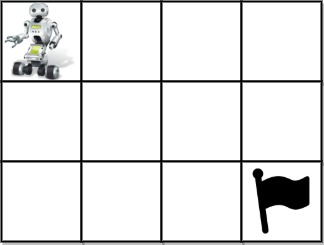980. Unique Paths III

Description
You are given an m x n integer array grid where grid[i][j] could be:
1representing the starting square. There is exactly one starting square.2representing the ending square. There is exactly one ending square.0representing empty squares we can walk over.-1representing obstacles that we cannot walk over.
Return the number of 4-directional walks from the starting square to the ending square, that walk over every non-obstacle square exactly once.
Example 1:

Input: grid = [[1,0,0,0],[0,0,0,0],[0,0,2,-1]] Output: 2 Explanation: We have the following two paths: 1. (0,0),(0,1),(0,2),(0,3),(1,3),(1,2),(1,1),(1,0),(2,0),(2,1),(2,2) 2. (0,0),(1,0),(2,0),(2,1),(1,1),(0,1),(0,2),(0,3),(1,3),(1,2),(2,2)
Example 2:

Input: grid = [[1,0,0,0],[0,0,0,0],[0,0,0,2]] Output: 4 Explanation: We have the following four paths: 1. (0,0),(0,1),(0,2),(0,3),(1,3),(1,2),(1,1),(1,0),(2,0),(2,1),(2,2),(2,3) 2. (0,0),(0,1),(1,1),(1,0),(2,0),(2,1),(2,2),(1,2),(0,2),(0,3),(1,3),(2,3) 3. (0,0),(1,0),(2,0),(2,1),(2,2),(1,2),(1,1),(0,1),(0,2),(0,3),(1,3),(2,3) 4. (0,0),(1,0),(2,0),(2,1),(1,1),(0,1),(0,2),(0,3),(1,3),(1,2),(2,2),(2,3)
Example 3:

Input: grid = [[0,1],[2,0]] Output: 0 Explanation: There is no path that walks over every empty square exactly once. Note that the starting and ending square can be anywhere in the grid.
Constraints:
m == grid.lengthn == grid[i].length1 <= m, n <= 201 <= m * n <= 20-1 <= grid[i][j] <= 2- There is exactly one starting cell and one ending cell.
Solution
unique-paths-iii.py
class Solution:
def uniquePathsIII(self, grid: List[List[int]]) -> int:
rows, cols = len(grid), len(grid[0])
fullMask = (1 << (rows * cols)) - 1
sx, sy = (-1, -1)
mask = 0
for x in range(rows):
for y in range(cols):
if grid[x][y] == 1:
sx, sy = x, y
mask ^= (1 << (sx * cols + sy))
if grid[x][y] == -1:
mask ^= (1 << (x * cols + y))
@cache
def go(x, y, mask):
if grid[x][y] == 2:
return 1 if mask == fullMask else 0
res = 0
for dx, dy in [(x + 1, y), (x - 1, y), (x, y + 1), (x, y - 1)]:
if 0 <= dx < rows and 0 <= dy < cols and grid[dx][dy] != -1 and mask & (1 << (dx * cols + dy)) == 0:
res += go(dx, dy, mask ^ (1 << (dx * cols + dy)))
return res
return go(sx, sy, mask)